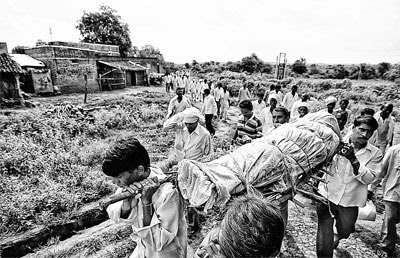Nagpr -April 30, 2013
Maharashtra Agriculture Minister
Radhakrishnna Vikhe-Patil admitted that Bt.cotton first GMO seed
permitted for commercial trial failed to give any positive result moreover he
admitted that Cotton yield in Vidarbha remains an abysmal 117 kg per acre. Even Pakistan
was doing better with 400 kg average yield.
"Today Bt cotton spread has
increased to 95%. We are now seeing that Bt may nave checked bollworm attacks
but incidence of other succulent pests remains. Despite high spending on costly
Bt seeds by farmers, the use of costly insecticides remains a matter of worry. Noting
that Bt cotton was benefiting seed companies more than farmers, he wondered why
our agriculture scientists and officials failed to promote time-tested
traditional varieties and indigenously developed hybrids. Cotton yield in
Vidarbha remains an abysmal 117kg per acre. Even Pakistan
was doing better with 400kg average yield" Maharashtra
agri .minister he added
here is the link
"frist time Agri minister
admitted that ICAR failed Echo the sentiments of the farmers in their reports adding to that the CICR
did too little to precious handle
for all these years to empower farmers to face changing conditions. He welcomed
Brazil experience and success of the high-density crop stand (HDCS) developed
by CICR moreover he was happy that HDCS using hybrid cotton had given fantastic
yields ranging from 20 to 50 quintals in trials conducted in eight districts of
the region much higher than Bt.cotton .” Agri minister announcing further that
state id promoting organic farming and
against chemical farming that is forcing vidrabha cotton afrmers in to debt”
Minister said .
‘More than 5 million cotton farmers
in Maharashtra cultivating Bt.coton over 44 lakhs hector has been facing cotton
crop failure and despair and distress due to debt is killing farmers hence we
welcome admission of maharashtra agriculture minister that BT. cotton
experiments in dry land region vidarbh and marathawada failed hence Govt. of India should not pass proposed
BRAI bill which will introduce GM seed in food crop too ,may result in to more
farmer suicides in other region too ,
Kishor Tiwari, president of the Vidarbha Jan Andolan Samiti, a farmer
advocacy group informed today .
In 2002, genetically
modified BT cotton seeds arrived.
Till around 1970, Vidarbha
farmers cultivated cotton using seeds from their own plants. With the start of
hybrid seeds, the yields increased significantly but so did the need for costly
fertiliser and insecticide.
Agriculturists have also blamed
the restrictions and royalties placed on Genetically Modified Organism (GMO)
seeds by Monsanto for the spurt in suicides.
Like the hybrid variety, they are
non-renewable terminator seeds, and must be re-purchased every year. Today they
dominate the market.
It has been pointed out by
several agriculturists that these new methods caused farmers to suffer losses
leading to debt, pushing them to suicide.
In August 2012, technical experts
appointed by the Supreme Court recommended a 10-year moratorium on all field
trials of GM food, as well as the termination of all current trials of
transgenic crops.
About 14,000 farmers
committed suicide in Maharashtra 2011 alone.
A NCRB report stated that in the
17 years from 1995 to 2011, 270,940 farmers committed suicide in the country.
Of these, nearly 20 percent were
only from Maharashtra , where 53,818 suicides
were reported.
Political experts and
agriculturists point out that the 11 districts of Vidarbha, though rich in
minerals, coal, forests and mountains, continue to remain underdeveloped
because of the dominance by political leadership from the other parts of the
state, especially western Maharashtra .
According to another report by
NCRB, in 2006, Maharashtra , with 4,453 farmer
suicides, accounted for over a quarter of the all-India total farm suicides of
17,060.
Yet another report from the
Bureau said that while the number of farm suicides rose since 2001, the number
of farmers has fallen, as thousands, in distress, turn their back to
agriculture.
"Also, the government has
never kept their word on the minimum support price of cotton. Last year, cotton
farmers had to take to the streets after Cotton Corp of India fixed the minimum support
price for cotton at Rs.3,300, far below the market rate of Rs.4,800 per
quintal," Tiwari said.
Farmers had then demanded that
the the minimum support price of cotton be raised from Rs.3,300 to Rs.6,000 per
quintal to cover increases in production costs.
"It is tragic to note that Maharashtra produces 50 percent of the country's cotton,
but its cotton-producing regions are infamous for farmer suicide," Tiwari
said.










